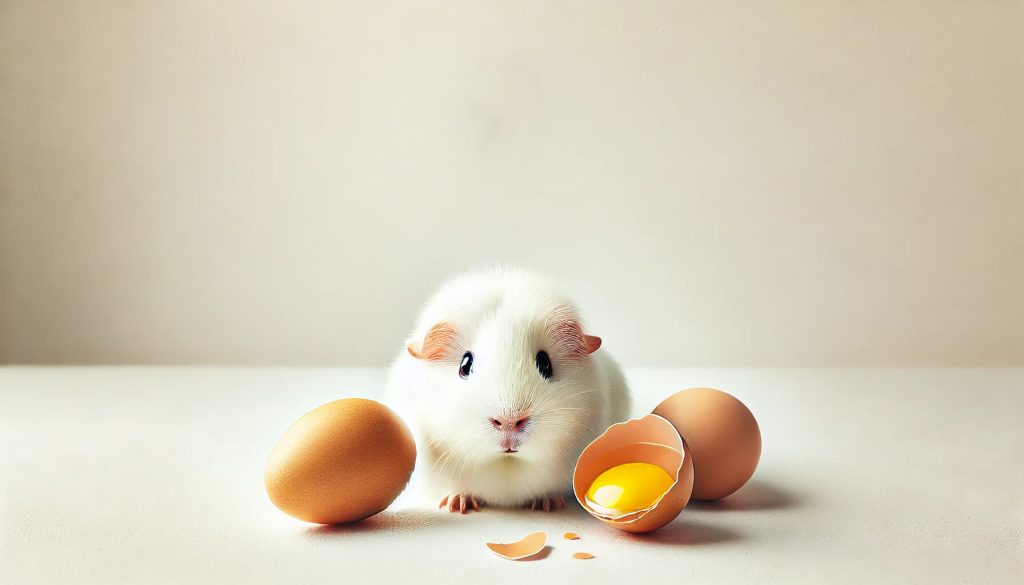
Can Guinea Pigs Eat Eggs?
Understanding Guinea Pig Dietary Needs
Guinea pigs require a specific diet to stay healthy. Understanding their dietary needs helps avoid health complications.
What Do Guinea Pigs Usually Eat?
Guinea pigs thrive on a diet of fresh hay, vegetables, and fortified pellets. Timothy hay should make up the bulk, providing necessary fiber. Vegetable examples include bell peppers and leafy greens like romaine lettuce. Avoid iceberg lettuce and fruits with high sugar content. Commercial pellets should be high in vitamin C to prevent scurvy, as guinea pigs can’t synthesize this vitamin.
Why Balance Is Key in Their Diet
A balanced diet helps prevent illnesses and obesity. Overfeeding vegetables or fruits with high calcium can lead to bladder stones. Too many sugary foods can cause gastrointestinal issues. Ensure consistent fiber intake from hay, regulate veggies, and provide vitamin C supplements when necessary. A balanced approach ensures your guinea pig remains healthy and active.
Can Guinea Pigs Eat Eggs?
Guinea pigs have specific dietary needs that require careful consideration.
The Nutritional Content of Eggs
Eggs contain protein, fat, vitamins, and minerals. One large egg has about 6 grams of protein, 5 grams of fat, and significant amounts of vitamins A, D, E, and B12. While these nutrients are beneficial for many species (humans, certain pets), they don’t align with a guinea pig’s dietary requirements.
Potential Risks and Benefits
Feeding eggs to guinea pigs can pose risks. Guinea pigs need a high-fiber, low-protein diet, typically sourced from hay, vegetables, and fortified pellets. High-fat and high-protein foods, like eggs, can lead to obesity and kidney problems in guinea pigs. Additionally, eggs lack vitamin C, which guinea pigs need in their diet to prevent scurvy. The risks outweigh any potential benefits, making eggs unsuitable for guinea pigs. Focus on providing appropriate foods to maintain your pet’s health and well-being.
Alternative Protein Sources for Guinea Pigs
Guinea pigs require a balanced diet to maintain optimal health. While eggs should be avoided, other safe protein sources can meet their dietary needs.
Safe Vegetables and Fruits
Include various vegetables and fruits to provide essential nutrients. Safe vegetables include bell peppers, carrots, and romaine lettuce. These vegetables offer fiber, vitamins, and minerals crucial for guinea pigs.
Provide fruits in moderation due to their sugar content. Safe fruits include apples (without seeds) and strawberries. These fruits offer vitamins, especially vitamin C, which is vital for preventing scurvy in guinea pigs.
Commercial Guinea Pig Food Options
Opt for commercial guinea pig food formulated to meet their specific nutritional needs. High-quality pellets fortified with vitamin C and low in calcium are ideal. This helps prevent issues like bladder stones.
Check labels to ensure the food is free from artificial colors and flavors. Select brands like Oxbow and Kaytee, known for their high-quality ingredients and nutritional balance.
These alternatives help maintain a balanced diet and keep your guinea pig healthy and happy.
Conclusion
By following a balanced diet tailored to your guinea pig’s needs, you can ensure they remain healthy and happy. Stick to fresh hay, vitamin C-rich vegetables, and fortified pellets while avoiding eggs and other inappropriate foods. Always check labels for artificial additives and choose reputable brands like Oxbow and Kaytee. Prioritizing their dietary requirements helps prevent health issues and keeps your furry friend thriving.
